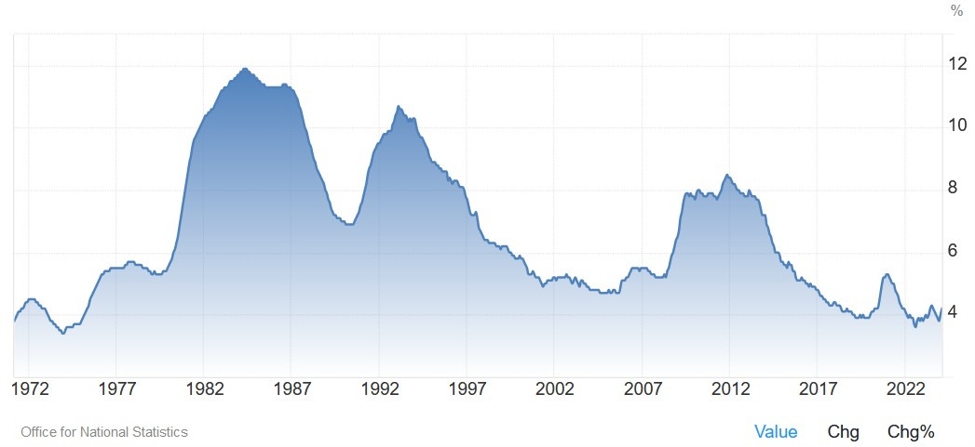UPCOMING EVENTS:
- Monday: New
Zealand Services PMI. - Tuesday: Japan
PPI, UK Labour Market Report, Eurozone ZEW, US NFIB Small Business
Optimism Index, US PPI, Fed Chair Powell speech. - Wednesday:
Australia Wage Price Index, Eurozone Industrial Production, US CPI, US
Retail Sales, US NAHB Housing Market Index, PBoC MLF. - Thursday: Japan
GDP, Australia Labour Market Report, US Housing Starts and Building
Permits, US Jobless Claims, US Industrial Production. - Friday: New
Zealand PPI, China Industrial Production and Retail Sales, Fed’s Waller
speech.
Tuesday
The UK Unemployment Rate is expected to
tick higher to 4.3% vs. 4.2% prior with Average Hourly Earnings (including
bonus) seen at 5.3% vs. 5.6% prior. Barring big surprises, this report is
unlikely to change much for the BoE as the central bank is more
focused on the two inflation reports ahead of the June meeting where it
could deliver the first rate cut. The market sees a 50/50 chance of a rate cut
in June at the moment.
UK Unemployment Rate
The US PPI M/M is expected at 0.2% vs.
0.2% prior, while the Core PPI M/M is seen at 0.2% vs. 0.2% prior. There’s a
risk of an upside surprise considering that both the prices paid components
in the ISM
PMIs jumped to cycle highs. The market will likely focus more on the US CPI
report coming out the following day, although a hot PPI might trigger some
defensive positioning into the CPI data.
US Core PPI YoY
Wednesday
The Australian Wage Price Index Q/Q is
expected at 1.0% vs. 0.9% prior. The Australian labour
market remains pretty tight with high wage growth and persistently high
inflation. Nonetheless, the RBA at the latest
policy decision refrained from turning overly hawkish as the central bank
continues to wait for more information. The market now sees the first rate cut
sometime in Q2 2025 with even some chances of a rate hike this year. High wage
growth without a looser labour market will likely make it hard for the RBA to
reach their target “within a reasonable timeframe”.
Australia Wage Price Index YoY
The US CPI Y/Y is expected at 3.4% vs. 3.5%
prior, while the M/M measure is seen at 0.3% vs. 0.4% prior. The Core CPI M/M
is expected at 0.3% vs. 0.4% prior. Given the market’s pricing and general fear
of persistently high inflation, a downside surprise will likely trigger a much
bigger reaction than an upside surprise. Fed
Chair Powell pushed back against rate hikes expectations as he stated that they
would need “persuasive” evidence that their policy isn’t restrictive
enough.
So, if inflation remains high but doesn’t
re-accelerate notably, they will just keep rates higher for longer. The market expects
almost two rate cuts (45 bps) by the end of the year which can easily go back
to one or even zero in case we get another hot inflation report. A soft report
might add one extra cut to the pricing but not much more as the Fed will want
to cut rates at a meeting containing the SEP (barring a quick deterioration in the labour market), which falls in September at the earliest.
US Core CPI YoY
The US Retail Sales M/M is expected at
0.4% vs. 0.7% prior, while the ex-Autos M/M figure is seen at 0.2% vs. 1.1%
prior. We got some soft consumer sentiment reports recently which might filter through
lower consumer spending. The retail sales data is notoriously volatile and
given that it will be released at the same time of the CPI report, the market
will likely ignore the release.
US Retail Sales YoY
The PBoC is expected to keep the MLF rate
unchanged at 2.50%. The data out of China has been mostly positive with
the latest inflation
rates slowly crawling out of deflation. Therefore, the central bank is
likely to keep the policy rates steady for the time being given the lack of
urgency.
PBoC
Thursday
The Australian Labour Market report is
expected to show 25.3K jobs added in April vs. -6.6k in March with the Unemployment
Rate ticking higher to 3.9% vs. 3.8% prior. The RBA is more focused on
inflation but if the tightness in the labour market continues, especially
with high wage growth, it will make it harder for the central bank to reach its
target “within a reasonable timeframe”.
Australia Unemployment Rate
The US Jobless Claims continue to be one
of the most important releases to follow every week as it’s a timelier
indicator on the state of the labour market. This is because disinflation to
the Fed’s target is more likely with a weakening labour market. A resilient
labour market though could make the achievement of the target more difficult.
Initial
Claims saw the first notable miss last week coming in at 231K vs. 215K
prior, which was the highest since August 2023. Of course, one miss doesn’t make
a trend, but it’s worth to keep an eye on this given the recent miss in the NFP
report and softer consumer sentiment data. This week Initial Claims are
expected at 220K vs. 231K prior, while there is no consensus at the time of
writing for Continuing Claims although the prior release showed an increase to
1785K vs. 1785K expected and 1768K prior.
US Jobless Claims
